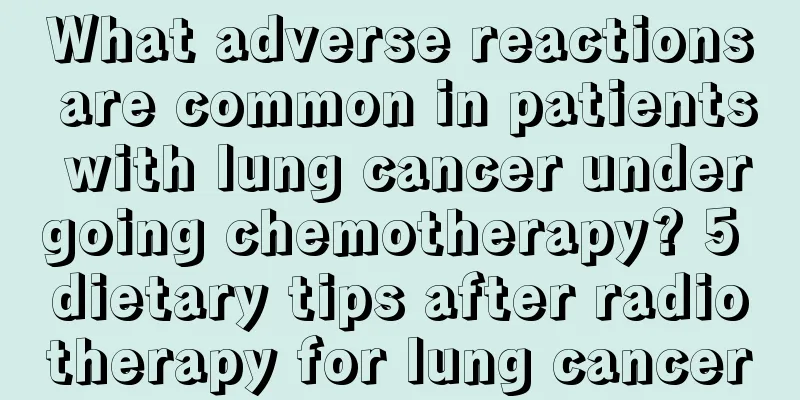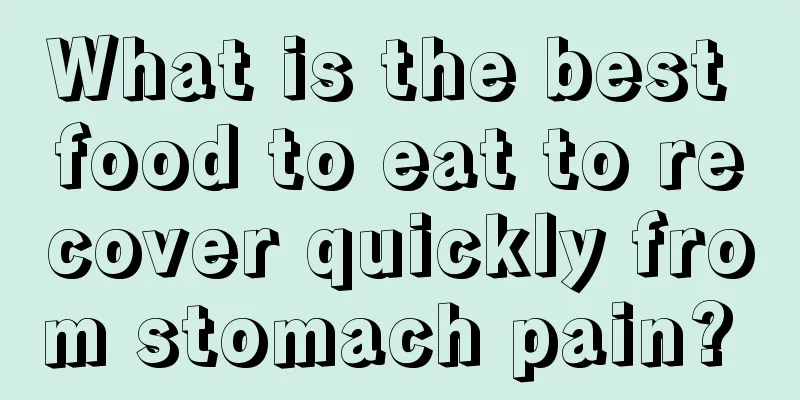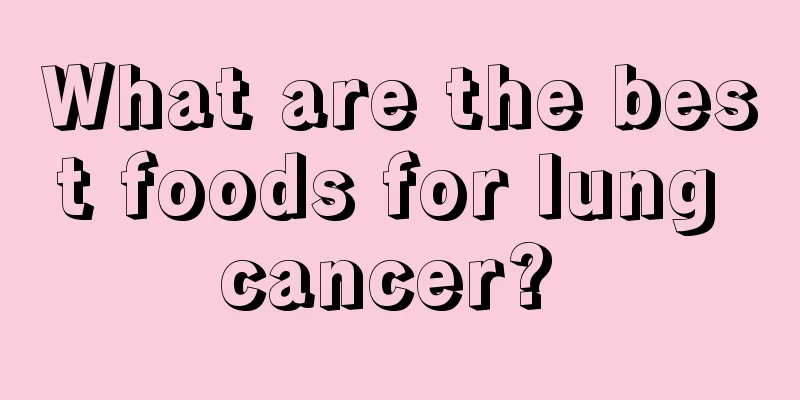What adverse reactions are common in patients with lung cancer undergoing chemotherapy? 5 dietary tips after radiotherapy for lung cancer

|
With the continuous improvement of medical technology, there are many ways to treat lung cancer, including chemotherapy. Chemotherapy can effectively kill cancer cells and inhibit the growth and reproduction of cancer cells. However, chemotherapy may cause some adverse reactions, which can be adjusted through diet. What adverse reactions may lung cancer patients experience after chemotherapy? Common adverse reactions that lung cancer patients experience after chemotherapy include nausea, vomiting, constipation, abdominal distension, diarrhea, thrombocytopenia, hypokalemia, oral ulcers, etc. How to adjust your diet after chemotherapy for lung cancer? 1. Eat light food when you have nausea and vomiting When chemotherapy causes nausea and vomiting, you can eat some light food. It is best not to eat food with strong odor or greasy food. Fresh fruits and vegetables are good choices. In addition, you should also eat small meals frequently and avoid fasting for a long time. 2. Eat more fiber-rich foods when constipation occurs When constipation occurs due to chemotherapy, you should eat more foods rich in fiber, such as vegetables, fruits, bran, red beans, mung beans, etc. If you can combine it with appropriate exercise and abdominal massage, the effect will be even better. 3. Eat foods that promote digestion when bloating occurs If you have abdominal distension after chemotherapy, you can eat more foods that can promote digestion, such as hawthorn, radish, leek, lotus root, etc. If you have diarrhea while having abdominal distension, you can eat some applesauce or radish paste. 4. Eat foods rich in iron and vitamin C if you have anemia If anemia occurs after chemotherapy, you can eat foods rich in iron and vitamins, such as animal liver, tomatoes, kiwis, carrots, grapefruits, etc. If the situation is more serious, you should take iron supplements under the guidance of a doctor. 5. Eat potassium-rich foods when you have hypokalemia When hypokalemia occurs after chemotherapy, you should eat some potassium-rich foods, such as bananas, oranges, winter dates, kiwis, etc. The effect will be better if you can eat foods that can promote potassium absorption, such as kelp, seaweed, lotus seeds, etc. Although lung cancer is a malignant tumor, it can generally be effectively treated if it is detected in the early stages. There are many ways to treat lung cancer, including chemotherapy, radiotherapy, surgery, targeted therapy, etc. No matter which method is used to treat lung cancer, you must actively cooperate with the treatment plan formulated by the doctor and provide careful care. Only by taking a multi-pronged approach can the disease be effectively controlled. |
<<: How to diagnose peripheral lung cancer? 3 tests to diagnose peripheral lung cancer
Recommend
What are the symptoms of ear neuralgia
Ear neuralgia is not just a symptom, but a common...
The dangers of spraying perfume under the armpits
In the hot summer, if you do some exercise or are...
What are the menstrual manifestations of endometrial cancer? Do you know these three manifestations?
If you have endometrial cancer, your menstrual cy...
Patients with joint injuries should pay attention to
Patients with joint injuries should receive relev...
Can malignant skin cancer be cured? It needs to be treated as soon as possible
Malignant skin cancer needs to be treated as earl...
Don't be careless if there are white spots on your nails, it may be a disease
Generally speaking, the nails of normal and healt...
What is the standard for mild obesity?
In daily life, we can see people who are obviousl...
How long does it take for liver fibrosis to develop into cirrhosis?
Liver fibrosis will continue slowly, from the ini...
Can't the cervical cancer vaccine prevent all cervical cancers? Do I need to choose the cervical cancer vaccine?
Prevention of cervical cancer is a compulsory cou...
What are the risk factors for lung cancer
Lung cancer has a huge impact on our body, so wha...
What symptoms of discomfort can spinal disease cause?
The spine is the most important part of our body....
What should patients with hepatitis B virus (HBsAg) pay attention to?
In addition to following the doctor's instruc...
What are the early symptoms of liver cancer? These tests can detect liver cancer at an early stage
A survey shows that about 110,000 people die of l...
Why do I have dandruff in summer but not in winter?
Dandruff is a very annoying problem, because if t...
What are the dangers of dream spirits
When men enter puberty, their genitals will devel...









